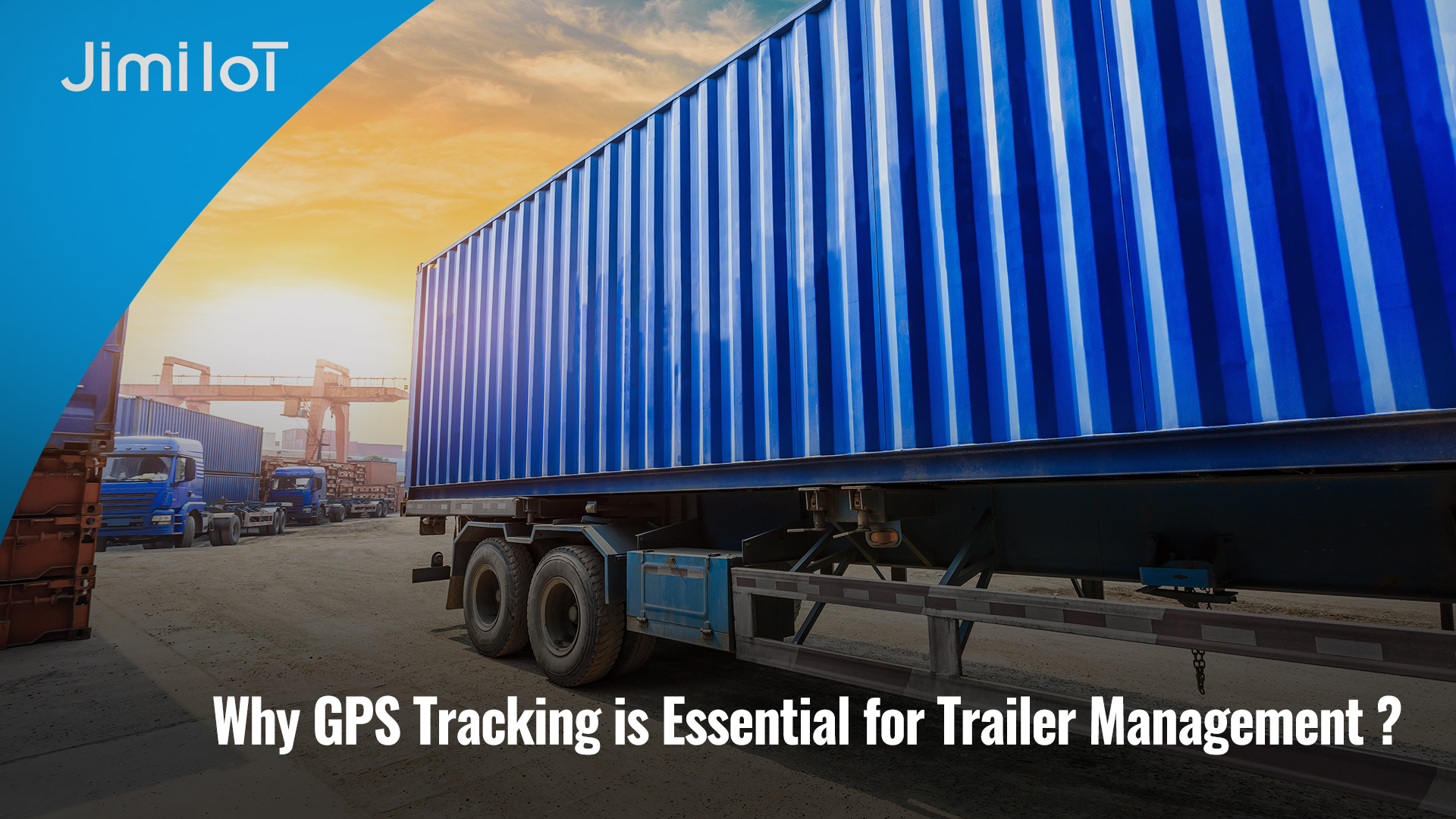In the ever-evolving world of logistics and transportation, efficiency, security, and visibility are critical factors in achieving operational excellence. While GPS tracking has become a staple for monitoring fleet vehicles, many businesses have yet to extend the same level of control and insight to their non-powered assets—particularly trailers. In an age where cargo theft, supply chain disruptions, and inefficiencies pose real threats to profitability, adopting GPS tracking for trailers is no longer optional—it’s a strategic necessity.

The Role of GPS in Asset Management
GPS (Global Positioning System) tracking technology enables real-time monitoring of trailer locations, movements, and statuses via a centralized software platform. It provides actionable insights that help fleet operators make informed decisions, reduce operating costs, prevent loss, and improve overall asset utilization. As the logistics industry continues to face increasing demands for reliability and transparency, trailer tracking serves as a powerful tool for maintaining control across every link of the supply chain.
Here are five compelling reasons why integrating GPS tracking into your trailer management strategy should be a top priority:
1. Theft Prevention and Unauthorized Use Detection
Cargo theft is a growing global issue. According to data from CargoNet, reported incidents of cargo theft in the U.S. rose from 797 in 2019 to 1,059 in 2020—a troubling trend that underscores the importance of asset security. Trailers, often left unattended in remote or unsecured locations, are particularly vulnerable targets for theft or misuse.
GPS tracking devices, when installed on trailers, act as both a deterrent and a recovery solution. Beyond simply showing real-time location, many GPS trackers are equipped with tamper detection and unauthorized movement alerts. If a trailer is moved without authorization or outside of working hours, fleet managers are immediately notified.
Advanced systems also support geofencing capabilities. By setting up virtual perimeters around approved areas—such as depots, customer sites, or designated delivery zones—you’ll receive instant alerts whenever a trailer enters or leaves these zones unexpectedly. This not only enhances security but also ensures regulatory compliance in certain operational contexts.
2. Accurate Auditing and Regulatory Compliance
Effective auditing depends on the ability to accurately account for all physical assets. In large fleets, manual tracking of trailer inventory is inefficient, prone to error, and can lead to costly discrepancies on balance sheets. GPS tracking automates the process by maintaining a digital log of each trailer’s status, location, and history.
Solutions like Jimi IoT’s asset tracking systems can provide real-time insights into the entire trailer inventory, making it easy to reconcile records during audits. Information such as trailer ID, make, model, mileage, and last known location is centralized and accessible at any time. This not only streamlines the auditing process but also supports compliance with financial and industry regulations that require thorough asset documentation.
3. Real-Time Event Monitoring and Environmental Control
For fleets transporting high-value or sensitive cargo—such as pharmaceuticals, food products, or electronics—visibility inside the trailer is just as important as tracking its location. Many GPS tracking devices now come equipped with sensors that detect and report on specific events, such as door openings, vibration, or environmental changes.
For example, temperature monitoring can trigger alerts when the interior climate deviates from a set threshold, allowing corrective action before goods spoil or become compromised. Similarly, alerts about door openings while en route can help identify potential tampering or security breaches. For operations where regulatory compliance and cargo integrity are critical, this level of monitoring is indispensable.
Moreover, tracking driving behavior—such as harsh braking, sharp turns, or excessive speed—helps protect fragile goods and informs driver training programs. Over time, this contributes to safer driving practices, lower insurance premiums, and reduced cargo damage claims.
4. Easy and Efficient Location Tracking
Managing a dispersed trailer fleet across multiple geographic regions can be overwhelming without accurate location data. GPS tracking allows managers to pinpoint the exact location of any trailer at any time through an intuitive software interface, typically accessible via desktop or mobile devices.
This functionality is especially useful when trailers are dropped off at third-party warehouses, construction sites, or customer locations. Rather than relying on manual updates or paper logs, fleet managers can simply consult the tracking dashboard to determine the current and historical movements of each trailer.
Additionally, route replay functions allow users to analyze past travel patterns, confirm delivery locations, or investigate unauthorized deviations. The time saved in locating assets—especially during high-demand periods—translates directly into improved dispatch efficiency and customer satisfaction.
5. Enhanced Trailer Utilization and Cost Optimization
One of the most overlooked advantages of trailer tracking is the ability to measure asset utilization. Knowing how frequently each trailer is used can help identify underperforming units and redistribute resources more effectively.
For instance, if a trailer remains idle at a particular location for several days or weeks, it’s a clear sign that it’s not being used efficiently. With this insight, you can choose to relocate the trailer to a busier route, assign it to a new project, or consider selling or leasing it out. This proactive approach prevents unnecessary capital expenditure and lowers total cost of ownership.
Ultimately, improved utilization allows fleet managers to do more with fewer assets—maximizing productivity without increasing operational overhead.
Conclusion
In a competitive and margin-sensitive industry, the ability to track, manage, and optimize trailers in real time is a game-changer. Whether your priorities are preventing theft, improving audits, monitoring sensitive cargo, or making data-driven decisions about trailer usage, GPS tracking delivers measurable value on all fronts.
As the logistics landscape continues to evolve, embracing technologies like GPS trailer tracking is essential for future-proofing your fleet operations. It’s a relatively small investment that yields substantial long-term benefits—including increased security, higher asset ROI, and improved operational visibility.
As a global leader in telematics and IoT hardware solutions, Jimi IoT delivers cutting-edge GPS tracking technologies specifically designed to help businesses manage trailers and mobile assets more efficiently. With a diverse portfolio of wired and wireless asset trackers, Jimi IoT’s solutions combine precision location tracking, event-based alerts, and cloud-based platform integration to provide unparalleled visibility and control. Whether you’re overseeing a small local fleet or managing a multinational logistics network, Jimi IoT empowers your operations with real-time intelligence and actionable data.
If your fleet already benefits from GPS tracking for vehicles, it’s time to extend those advantages to your trailers—ensuring that no asset goes unmanaged, unprotected, or underutilized.
Why JimiIoT
JimiIoT is a global leader in innovative IoT solutions. We provide cutting-edge hardware and software tailored to enhance efficiency and connectivity. Our range of products includes advanced GPS tracking devices, asset management solutions, smart vehicle dashcams, and telematics platforms. With a focus on technological excellence and customer satisfaction, we empower businesses to optimize operations and gain valuable insights from data-driven analytics. Trust JimiIoT to drive positive change and unlock growth opportunities in the digital age.
If you would like more details, please visit Facebook, LinkedIn, INS, and Twitter pages for further information.
